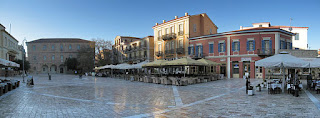Dixie-Confederate states Greeks
Intro 1528 : Don Theodoro,officially the First Greek to have been to what is today USA, lands in Florida . 1592 : Greek Captain Juan de Fuca sailed up the Pacific coast under the Spanish flag, in search of the fabled Northwest Passage between the Pacific and the Atlantic. He reported discovering a body of water, a strait which today bears his name: the Strait of Juan de Fuca, which today forms part of the Canada–United States border. 1768 : 500 Greeks create the first Greek colony in USA, particularly in Florida . 1850's : The first significant Greek community to develop in USA, in New Orleans, Louisiana *Before 1890, the vast majority of Greeks, either during the first colonial wave or later as immigrants prefer the Southern states Greeks in the American civil war In 1861, the Greeks living in New Orleans organized their own volunteer militia regiment to fight on the Confederate side in the Civil War. a note from the May 28, 1861 issue of the D...

